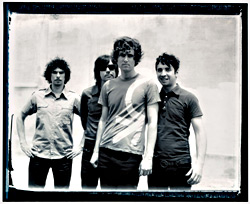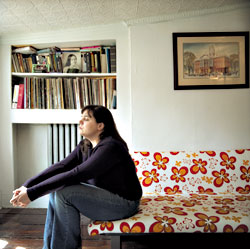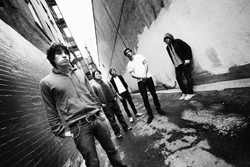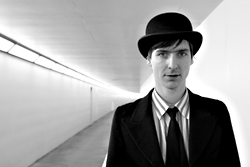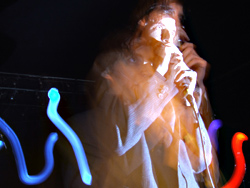When the Rapture completed the two years’ worth of touring they did in support of 2003’s Echoes, “burnt out” was the phrase that most accurately reflected the four members’ collective mental state. “We were really tired,” says drummer Vito Roccoforte, on the phone from the Brooklyn home he saw precious little of during that time. Still, rest wasn’t the only item on the outfit’s agenda: Bored stiff with the stuff on Echoes—the inevitable result of performing the songs onstage every night—Roccoforte and his bandmates had developed a healthy appetite for new music. So at the beginning of 2005, he, singer-guitarist Luke Jenner, bassist-singer Mattie Safer, and saxman Gabe Andruzzi set up shop in a friend’s Lower East Side studio and began writing Echoes‘ follow-up.
“Right away, we had a really big argument that lasted for two days,” Roccoforte laughs, “about a bunch of shit that had built up over tour.” What kind of stuff? “Not specific musical things, but more people’s roles in the band, what everybody wanted to do. We just had to air it out and talk about what everybody was feeling.”
That kind of warm-and-fuzzy group therapy isn’t what you’d expect from a chilly New York dance-rock act. But then, the Rapture upended lots of dance-rock expectations on Echoes, which introduced a band interested in more than the hipster-disco throb of “House of Jealous Lovers,” their seminal 2002 single. Roccoforte says that the eclectic Echoes—which alternated funk-punk rave-ups with lovely bits of Beatles-esque pop—sounds like a mixtape to his ears, which is a large part of its charm. For the Rapture’s new album, Roccoforte explains, they wanted to expand the scope of their music, while making it cohere more tightly. And that required the Metallica/Some Kind of Monster approach.
“We had to kind of open these lines of communication that had been cut off for a long time, basically from touring a lot,” Roccoforte says. “The main thing for me was that I really made a conscious effort—I think everybody did—to let everybody else in the band have their say, to express themselves a lot more and work through their ideas.”
The result of that more open-minded approach, Pieces of the People We Love, bears out the cooperative spirit Roccoforte describes. It’s a brighter, friendlier record than the brooding Echoes, full of groovy good-vibes disco-rock that rarely opts for noise over melody. Opener “Don Gon Do It” has gorgeous tight-harmony vocals; the title track sports the same shuffle-glam beat as Gary Glitter’s “Rock and Roll Part Two”; lead single “Get Myself Into It” rides a sax riff seemingly lifted from some forgotten C+C Music Factory track; “The Devil” features Jenner working his considerable falsetto and doing breathy porn-starlet oohs and aahs. “Whoo! Alright—Yeah . . . Uh Huh,” the album’s excellently titled centerpiece, is pure Rapture 2.0, a supercatchy cowbell clanger (with female-chorus backing vocals) in which Safer laments the sorry fact that “people don’t dance no more/They just stand there like this/They cross their arms and stare you down and drink and moan and diss.”
“‘The Devil’ probably never would’ve gotten written two years ago,” Roccoforte admits. “When we were working on it, it sounded really pop and kind of like a stretch. My first reaction was, ‘I’m not sure about this. I’m not sure if I like this song or if I don’t like it.’ In the past, I would’ve jumped all over it immediately and shut it down. But this time around, I really made an effort to be like, ‘OK, I’m gonna shut up and just listen.’ And a lot of times, what somebody was trying that I wasn’t sure about, by the end I really liked.”
Roccoforte’s quick to share credit for People‘s stylistic shine-up with the disc’s three producers: Ewan Pearson, a hip English remix guy who took on Echoes‘ “I Need Your Love”; Paul Epworth, the Rapture’s one-time sound guy; and Danger Mouse, the Gnarls Barkley mastermind. (Roccoforte dismisses blog-fueled rumors of a falling out with the DFA, the New York duo who helmed Echoes. “We were curious and excited to try working with somebody else,” he says. “Plus, James [Murphy] was busy with LCD Soundsystem.”)
But the drummer admits that the Rapture’s growth came from within. “We wrote, like, 30 full songs,” he says of the band’s prodigious preproduction work. “Later we spent a lot of time sequencing, figuring out which 10 songs worked together best. I’ve always been a fan of something you listen to and then wanna listen to again, you know? That’s what we went for with this.”
